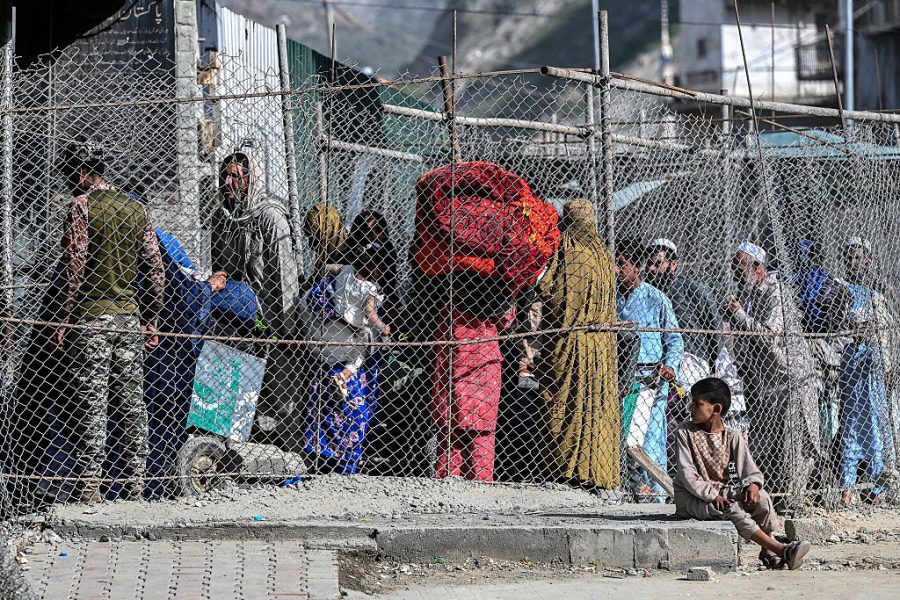This month Pakistan has expelled more than 80,000 Afghans in what the government has labelled its Illegal Foreigners Repatriation Plan. In total, since September 2023 the United Nations estimates that approximately 910,000 Afghans have reluctantly returned to their country. Many of these are holders of Afghan Citizen Cards (ACC), which were given to them when they arrived.
The Pakistan government has given Afghans until today to leave. After this, they will be forcibly deported. The Interior Ministry has warned landlords that ‘strict action’ will be taken against them henceforth if they provide accommodation to undocumented Afghans. Pakistan justifies the mass expulsion on security grounds, alleging that many Afghans ‘contribute to rising criminal activities within its borders’.
Human rights organisations such as Amnesty International have been vocal in denouncing Pakistan
Most of those being expelled are not criminals. Many have lived in Pakistan for years, since the Taliban first took control of Afghanistan in the late 1990s. Some have been born in Pakistan and know nothing of the land of their parents. ‘I was born in Pakistan and have never been to Afghanistan,’ 27-year-old Allah Rahman told a journalist from AFP last weekend as he prepared to cross the border.
The prospect of life under the Taliban is particularly terrifying for the women and girls being forced out of Pakistan. ‘They will be sent back to a country where conditions are extremely harsh,’ said Moniza Kakar, a Pakistan-based human rights lawyer. ‘Forcing them back into that fire is a violation of international law.’
According to Pakistan’s Express Tribune, ‘the deportation campaign has widespread support’. The newspaper quoted a hairdresser who said: ‘They came here for refuge but ended up taking jobs, opening businesses.’
Human rights organisations such as Amnesty International have been vocal in denouncing Pakistan. Western media organisations have also reported on the human tragedy unfolding on the border with Afghanistan, but in general they’ve gone easy on Pakistan.
When Donald Trump orders the deportation of undocumented migrants he is called a ‘fascist’; these same Western columnists don’t use that word to describe the actions of a Pakistani government which is condemning hundreds of thousands of females to a wretched future. This week the New York Times partially blamed the West for what Pakistan was doing, claiming the government has ‘been emboldened by a tide of anti-immigrant sentiment’ in the US and Europe.
The EU has not forcibly deported hundreds of thousands of undocumented migrants, although there are some in Europe who do like the idea of ‘remigration’. Germany’s right-wing AfD, for example, last year suggested that this was the way forward. This led to a public spat with Marine Le Pen. The leader of France’s National Rally expressed her opposition to ‘remigration’, as has more recently Nigel Farage.
A YouGov survey last August asked Britons if they would support ‘a move to increase the number of deportations of illegal immigrants from the UK’: 67 per cent said they would and only 8 per cent expressed strong opposition to the idea.
One problem that European countries encounter when they do try and deport an illegal alien is a lack of cooperation from their country of origin. Pakistan is one of those countries. In 2015, Islamabad suspended an agreement with the EU about accepting deported criminals. ‘Accusing any Pakistani of terrorism without evidence is human rights violation,’ said Interior Minister Chaudhry Nisar
Last year, Britain attempted to deport two ringleaders of the Rochdale grooming gang, Qari Abdul Rauf and Adil Khan, but Pakistan refused to allow their return. This was despite the fact that in 2022 the then Home Secretary, Priti Patel, signed a treaty with her Pakistani counterpart which, in the words of the government press release ‘will return foreign criminals and immigration offenders from the UK to Pakistan’.
There are quite a few Pakistani criminals in Britain; that same government press release explained that they ‘make up the seventh largest number of foreign criminals in prisons in England and Wales totalling nearly 3 per cent of the foreign national offender population’.
There are also quite a few in French prisons, like Zaheer Mahmood, 29, handed a 30-year sentence this year for the attempted murder in 2020 of two people he mistakenly believed worked for Charlie Hebdo. Last year, Dilawar Riaz was sentenced to 22 years in prison for the death of a 91-year-old Parisian he attacked during a burglary.
A growing number of Pakistanis are arriving illegally in Europe; in 2021 there were 4,000, a figure that tripled in 2022. According to Frontex, Europe’s border agency, so far in 2025 Pakistanis are among the top three nationalities crossing the Mediterranean from North Africa.
Perhaps only a minority will engage in criminal activity, but one can say the same about Afghans living in Pakistan. That didn’t prevent the Pakistan government from launching its Illegal Foreigners Repatriation Plan on the grounds that Afghans ‘contribute’ to rising crime.
One wonders what would be the reaction in Islamabad if Britain and Brussels implemented an Illegal Foreigners Repatriation Plan. Of course, they won’t. Illegal immigrants have human rights in Europe. Unlike in Pakistan.








Comments